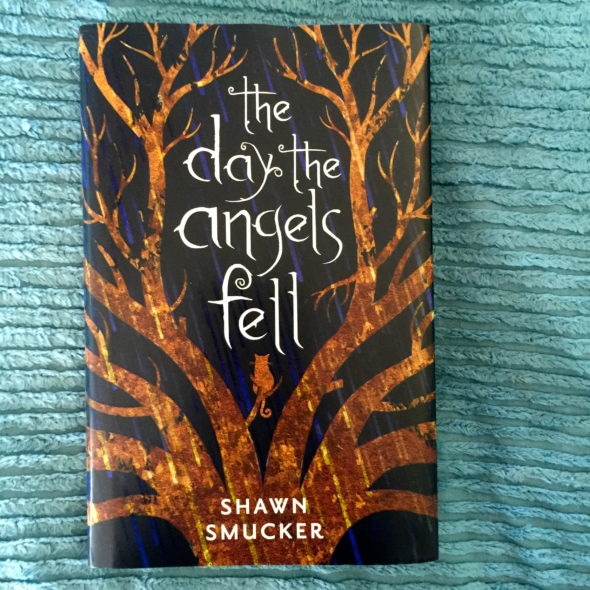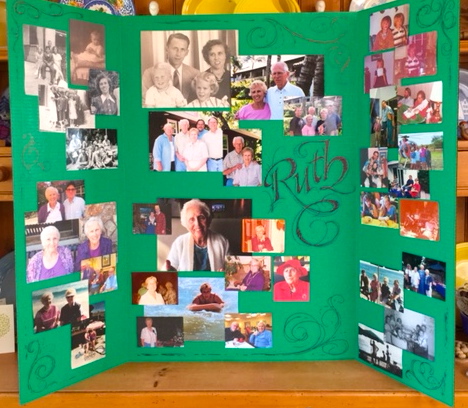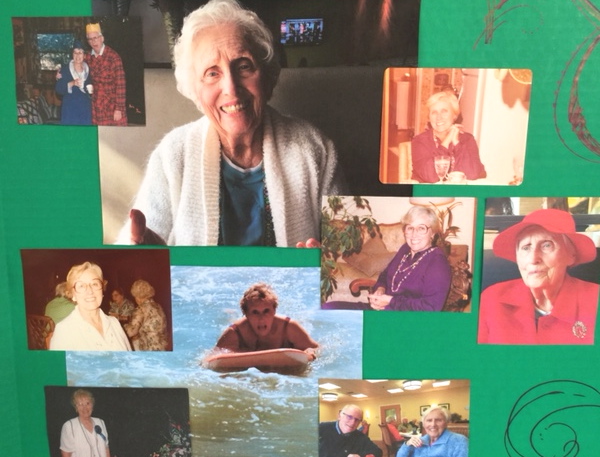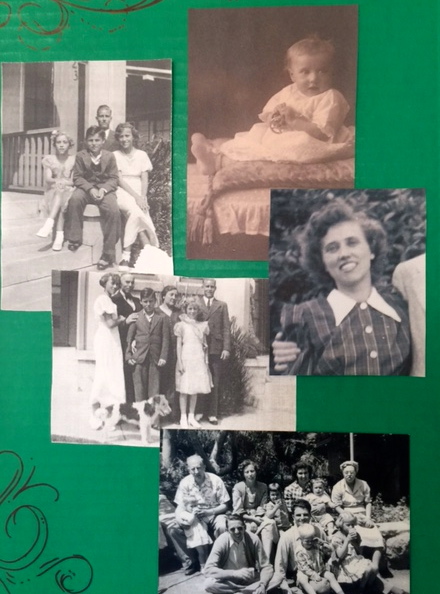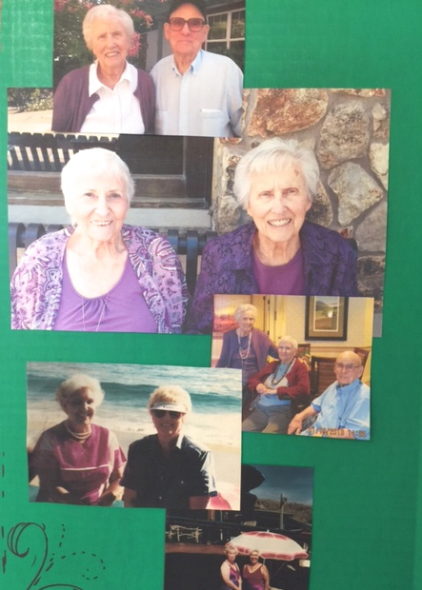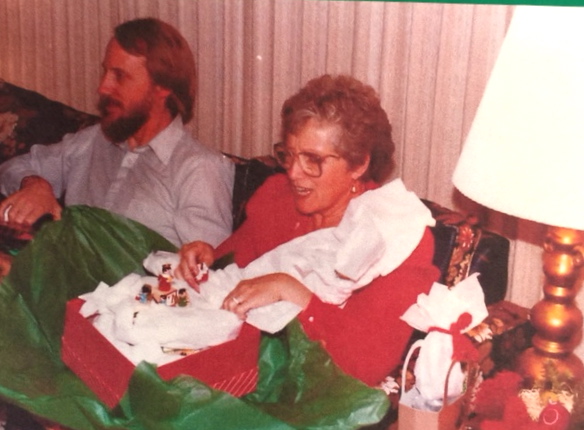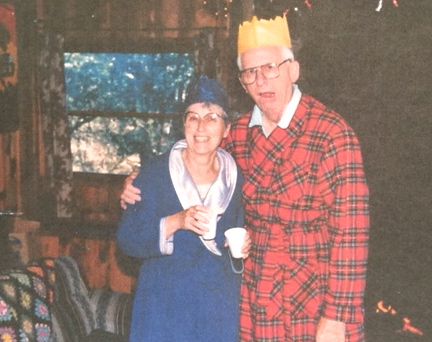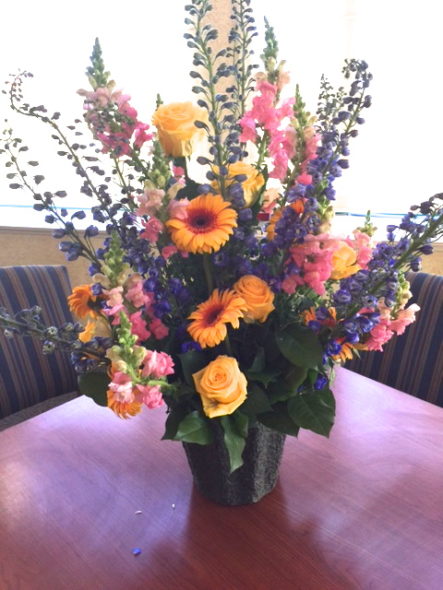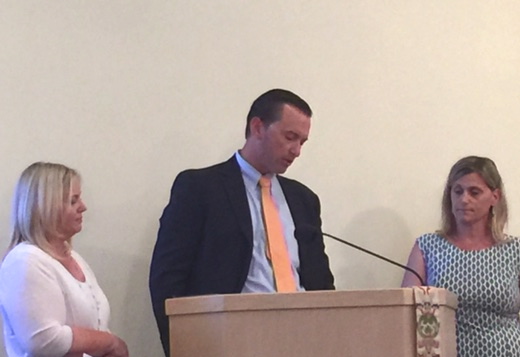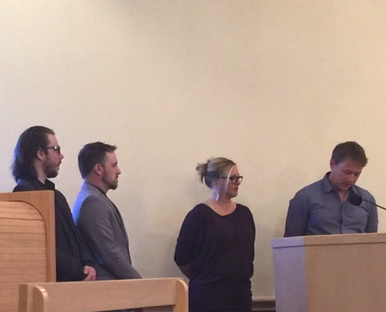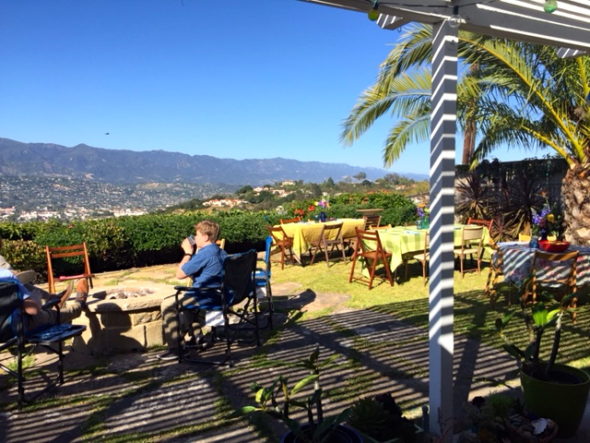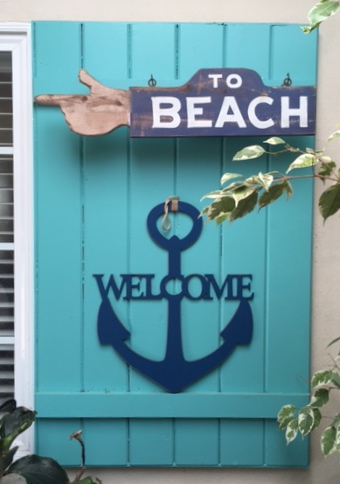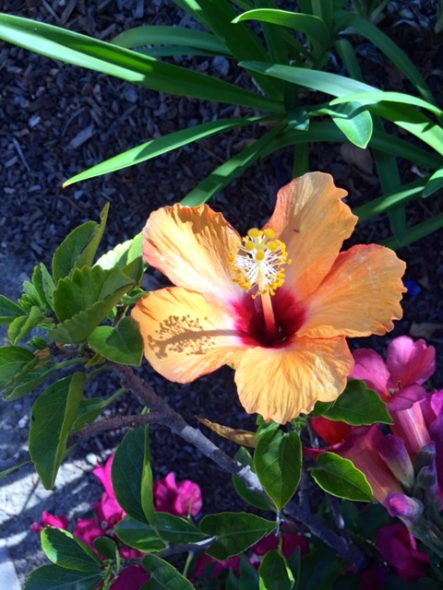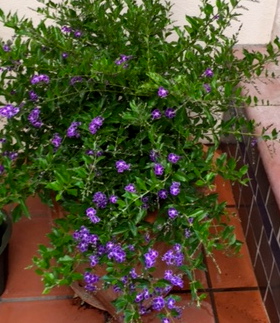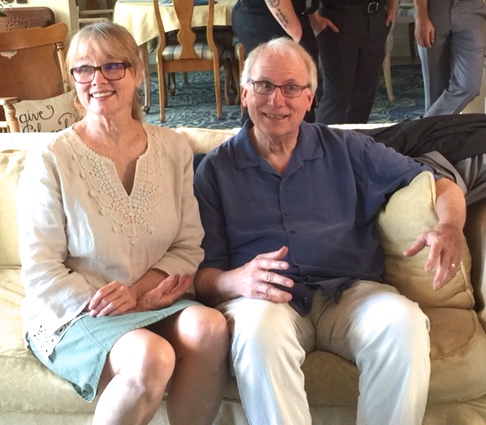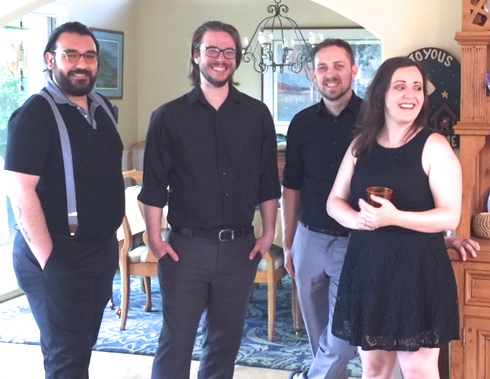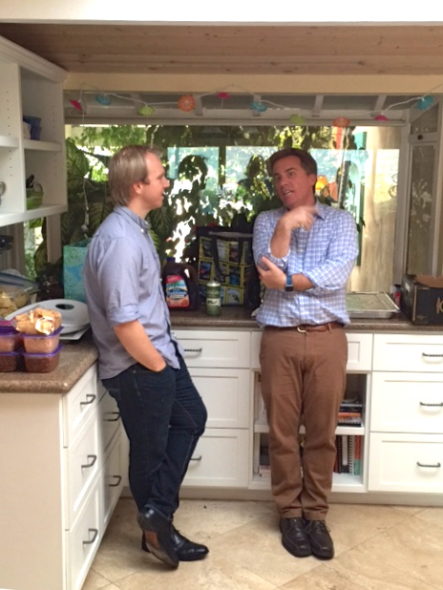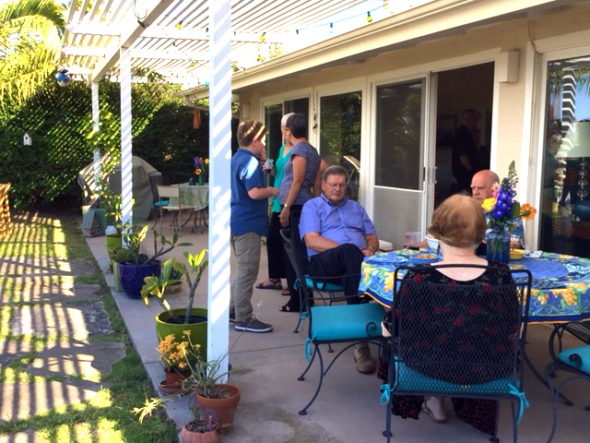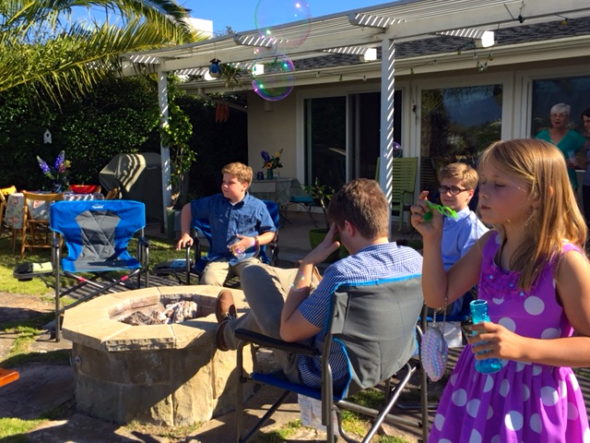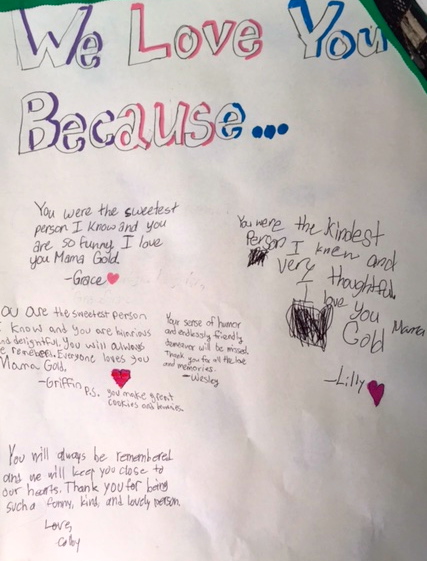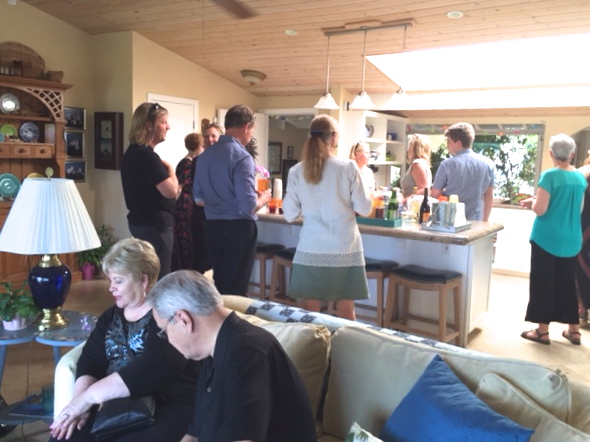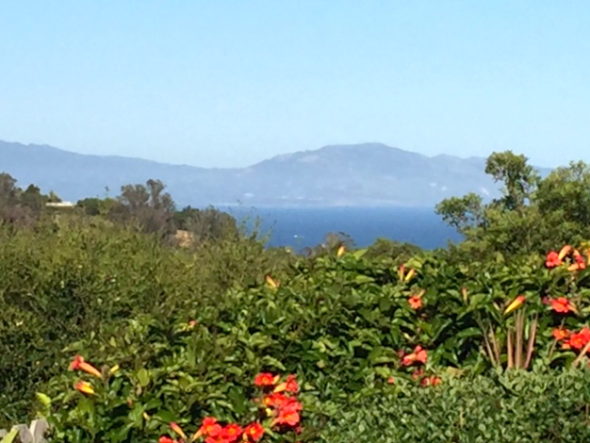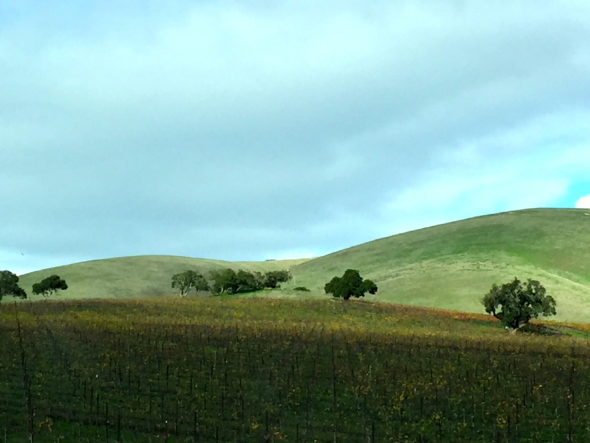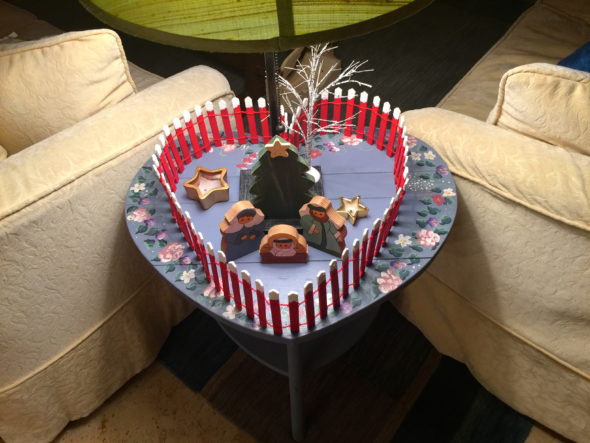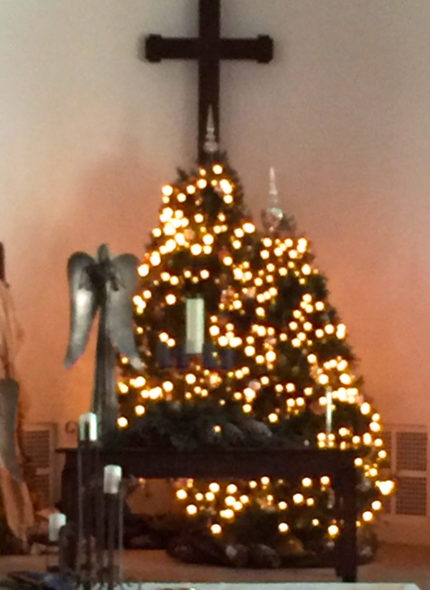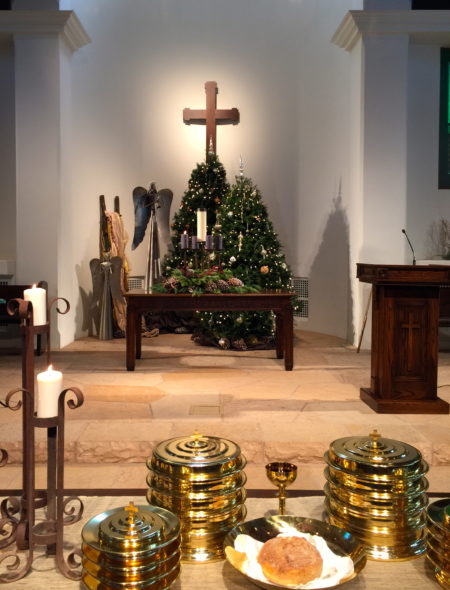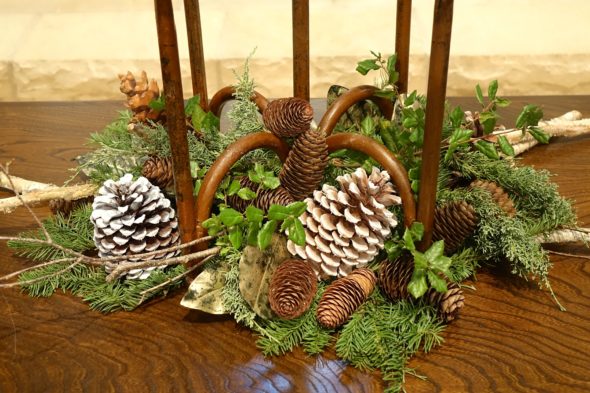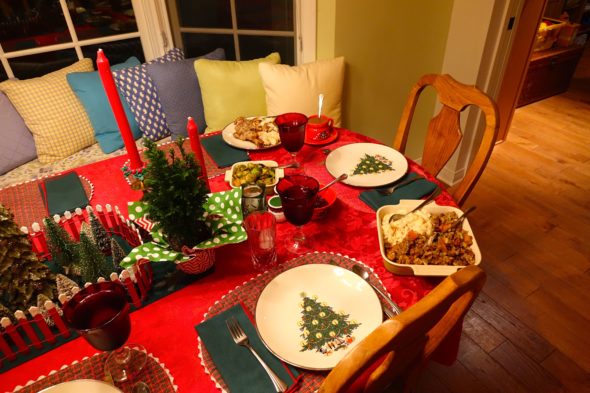Two years ago, I wrote the following review of a book written by a friend of mine named Shawn Smucker. I loved it then and even helped to kick-start his self-publishing journey. Now, a major publishing house has brought out a new edition, with a stunning new cover, but the same wondrous story. It’s a keeper and a repeater, friends, and I encourage you to order yourself a copy — and get one for a friend, while you’re at it!
The Land of Tears — SheLoves, June 2017
From The Little Prince: “It is such a secret place, the land of tears.”
— Antoine de Saint-Exupéry
This land is a place I’ve visited many times over my life, a strange and secret country, indeed.
I could say it feels familiar, except that it doesn’t. Not quite. Each visit is unique, bringing its own sadness, regret, emptiness, and eventually, fullness and replenishment as I wend my way back to the familiar terra firma of ‘regular’ life, whatever the heck that is.
After a winding journey of several years, my mama died from Alzheimer’s disease in April of this year. There have been tears all along the highway of this Thief of Time and Remembering, of course. Oodles of them. But none quite like the ones that spilled that Wednesday afternoon in April, standing by her hospital bed. I saw her leave us — an open-eyed gaze, two loud gasps, followed by the strangest silence I’ve ever experienced. I will be forever grateful that I was able to say good-bye . . . thank you . . . I love you.
Or the tears that sprang to my cheeks as I drove out of a doctor’s parking lot one week later, remembering how I have always planned my medical appointments around mom’s schedule these last few years, and wishing fiercely that she could be next to me in my car just one more time. I know there are many tears that have not yet worked their way into the air that surrounds me, tears I carry in this body, waiting behind my eyelids, behind my heart. Each one, shed or yet to be, remind me that grief is a land of secrets, of strange and sudden surprise.
I understand that losing my last parent at the age of 72 is a rare thing. I am grateful for that truth, grateful for her long life, and for my own, glad that we could be together more closely these last few years. Nevertheless, this feeling of loss is real. It winds its tendrils around me in ways that surprise and perplex me, showing up in simple things — like driving down a particular street or watching a television series we used to enjoy together. It stings when I see the bags of clothing waiting for the Goodwill truck or when I pick up a photograph. Though I’ve been here before, this trip feels particularly treacherous and very, very lonely.
We held her memorial service a full month after her death. It was a lovely afternoon, full of memories, scripture, and sweet, old songs. There were digitized home movies, good Mexican food in our backyard after the service, and lots and lots of shared stories. She would have loved every minute of it. In fact, I’m quite sure she did.
The next morning, life moved on. It was time to be ‘the pastor’ for a while, six years into retirement. I led in worship, preached a charge to our fine new confirmand, then went home and collapsed, eager for some space to weep and rest.
But it was not to be. Why?
To find out why it was not to be, please click on this link and read the rest of this piece over at SheLoves today. Join the conversation!
One Last Good-Bye
It’s been a weekend.
Yesterday, we held a memorial service for my mother. My brother was well enough to travel south and as soon as he, his wife, Sandy, and their daughter, Rachel, arrived at our home on Friday night, I put the women to work creating this wonderful photo montage for the reception after the service.
Both of them are talented artists and I was relieved to pass along this last task connected to what was a grand day of celebration and thanksgiving. About 75 of us gathered in the chapel at The Samarkand. Together, we worshiped God and celebrated mom’s life. It was a gift and a privilege to share stories, to laugh, to tear up from time to time, and to mark the passing of this valiant, vibrant woman, the last of her generation to leave us.
I’m including the words of remembrance that I shared yesterday so that family members who could not be there can read and remember with us. Some photos from the day, too.
A lovely collection of snapshots covering several decades of mom’s life.
“For the first few years of my life, she was ‘mommy’ to me. From about the 3rd grade on, she became simply, ‘mom.’ And during these last, hard years, the name that most often came to my lips was, ‘mama.’
“I think that choice was the natural one because she had become so very frail and ‘mom’ seemed far too robust to use. I also think it came naturally because it has a tender sound, a diminutive feel. She became smaller and smaller over these last four years at the Samarkand. With each move, we re-distributed more and more of her material belongings until little was left. Her life, her surroundings, became smaller and smaller. And she herself began to shrink away from us. As she stopped even wanting to eat, she gradually became quite tiny, almost wraith-like.
Eileen, Harold, Ruth, Al, in the back. I think Mom was about 12 in this picture.
“The irony in that, of course, is that it was her lifelong desire to be smaller than she was! Oh, how she wrestled with her weight. And she passed that wrestling right on down to me, in all kinds of ways — some of them undoubtedly genetic. But some of them, having a lot more to do with appearances, with wanting to please others, with a deep yearning to be something, someone, other than who and what she was.
Days gone by (long gone by!)
But here is what I have I learned as I have walked with my mother through this last, long part of her journey on this earth: the truest thing I know about my mother is that she was BEAUTIFUL, in every way I can think of. The saddest thing about my mother is that she never really knew that.
Oh, how I hope she knows it now!
Al passed away in his early 50’s, but mom and Harold and Eileen lived long and stayed close.
Mom was the last to leave us.
My dad’s distant cousin, Jan Baylor (whom we called Earleen – her middle name, after her father Earl), was a fun friend for mom, especially during the middle decades of her life. She’s in the bottom left photo and the very bottom one, which you can barely see — in identical swimsuits (unbeknownst to them until mom visited Jan at her trailer near the beach!)
My mother radiated light. At her best, she was the most fun person I’ve ever known. She had a bawdy sense of humor and a great laugh; she took delight in her children and her grandchildren, adored her husband — even when he frustrated the daylights out of her — and she particularly loved seeing and creating beautiful things. She had an artist’s eye for color, enjoyed a minimalist, mid-century sense of décor, and could become rapturous over a sunset, a seascape, a forest or a tiny baby.
See that look of delight on her face? Yeah, we saw that a lot at Christmas! That’s my brother Tom, back in the day . . .
Every once in a while during these last years, I would catch a glimpse of that great sense of humor and it always delighted me. Here are two small stories I recorded in my journal, one from Christmas of 2014, the other from April of last year:
Story number one, from Christmas Lunch in Heritage Court at the Samarkand:
“After lunch, we went back to her room, and she asked the same set of questions that she’s asked the last few times we’ve talked. And when I answered I tried to speak clearly. But her hearing is so bad, that she struggled to understand. Finally, the third time she asked me to repeat myself, I spoke very loudly, very slowly, very distinctly, and she looked at me, smiled and said, ‘THANK YOU,’ at the top of her lungs! It struck me as something the ‘old’ mom would do. And it made me laugh out loud. I was so tired and emotionally vulnerable — I got started laughing and couldn’t quite stop. And I remember thinking, ‘well, it’s better than crying.’”
Goofing it up at a Christmas spent in Tom and Sandy’s cabin in Julian CA
And another story, from a year ago April, during one of our twice-weekly lunches out:
Today’s theme song was, “The Old Rugged Cross” and she sang pieces of it through our entire time together. I was able to find a couple of versions of it online and play them in the car as we drove south toward the water.
She does love taking this drive. She comments on the cars, on the houses, on the large numbers of people. The confines of her world these days are very restricted, very limited. When I take her out into the wider world, she is struck with wonder.
It is good to see where I live through her eyes, as I too often take it all for granted. We ate at Longboard’s, overlooking the harbor. And there was a cruise ship in town today, unloading its throngs of people to sit on various tour buses and populate the local seaside restaurants. The wait staff was extremely slow because of the increased numbers, and as we were waiting for our food, she said, rather than sang these two lines from the day’s theme song: “so I’ll cling to the old rugged Cross, and exchange it someday for a crown.”
And then she said, “And sometime between now and then, I’d really like a little something to eat!”
And we both busted up. These sweet moments are flashes of the mama I have always known, and I am so grateful for them.”
There were two of these glorious arrangements for the service. We left one for the chapel service this morning and took this one home to re-use it as table decor for the family dinner that came after the reception at The Samarkand.
She was, as I told the staff here and at Hospice, the most flaming extrovert I have ever known. She loved people, was a caring neighbor and built friendships that lasted for decades. A friend reminded me the other day that on that first Valentine’s Day after my father’s death in 2005, she went to CVS and picked up a half dozen small boxes of chocolates to take to all the widows she knew at Hillcrest, their retirement community in La Verne CA. She knew their sweethearts would not be remembering them on that day. She kept up the chocolate-giving until she had to move into assisted living in 2012.
Each of mom’s grandchildren participated in reading scripture for her service. Our three are in the top photo, doing the Old Testament readings — L to R, Lisa, Eric, Joy
The bottom picture includes Jacob Gold and Jeremy Morgan, my brother Ken’s two sons, and Rachel and Dylan Gold, Tom and Sandy’s two children.
The disease that took her life is a cruel one, a thief with no mercy, slowly stealing memory, cognition, discernment, even personality. But in my mother’s case, dementia was never able to destroy the core of who she was.
And the core of my mother was her faith.
From about the age of fifteen, my mother was an ardent follower after Jesus, wanting to go deep, to learn, to practice resurrection from day to day. Even though her background was conservative, she and my dad somehow managed to grasp the truest things about the Christian faith and to let go of much of the judgment, fear, simplistic jargon, and insider/outsider mentality that has come to characterize too much of the modern church.
It was a beautiful and VERY WARM afternoon for an early dinner, planned and executed by my three kids and their spouses — thank you, thank you, THANK YOU to each of you.
She was grateful for her roots, for the women at Trinity Methodist Church who befriended her and encouraged her leadership skills, even paying for her to go to a special training event put on by Henrietta Mears, one of the first women leaders in the Presbyterian church of the 20th century. But she was always searching for more – and she read widely and well in order to learn more. She was not a perfect person — who is? But, man, she was a good one.
Our funky but fun covered atrium entry greeted guests with bright colors, wooden signs . . .
I believe, in the deepest part of me, that what I saw in my mom as she slowly faded away from me, was a reflection of the light of Jesus. She always let it shine. Always. Just about 40 hours before she died, she reached out to kiss my hand as I straightened her bedding. Days before she left us, she offered that beautiful smile and those kind words — ‘thank you so much!’ ‘You look so beautiful today.’ ‘I love your hair.’ By that point, almost nothing else she said hung together with any kind of sense. But those short, kind compliments? They remained. They remained.
. . . and some glorious blossoms, too.
Now Tom and I could tell you tales of tears, of anger, explosive and sharp, of deep-seated insecurities that often made her fearful and sometimes harsh. But you know what? As hard as those days were for us — and they were — over the span of our lives and hers, they amounted to so little. As she grew in her faith, as she and dad grew more deeply in love over the years of their marriage, and as she experienced more and more of the Love with a capital “L” that she and I believe is the power that sources our entire universe, those hard days became less and less frequent.
My dear brother, Tom, with his amazing and talented wife, Sandy.
I had the gift of a good home and that enabled and instructed me in creating what I hope was a good home with Dick for our kids. Over these last years, I have been struck again and again by how central my mother was in my own formation and ultimately, in the formation of my kids, and now my grandkids. She came from such a place of damage, with an alcoholic father and a mother who worked full-time. But she was found by God and loved by the aunts who helped to raise her, by those women at Trinity Methodist, and then by my dad. And that made all the difference.
Although our brother Ken passed away in 2009, his kids were part of the day — R to L,
Christina and Jeremy Morgan (I had the great gift of marrying these two five years ago; they have an adorable baby boy who did not make the three hour drive with them); Jacob Gold and his fiance, Kevin Herrera.
Of much deeper importance than the scars I bear from my early life, are the graces that mark me because of my mother. She was the primary spiritual influence on me for many years and I am so very grateful for that truth. She modeled the honest, searching spiritual journey. She also modeled loving hospitality, and a great sense of fun and creativity.
Our eldest grandson Ben, who arranged for some fun home movies to run on the TV in the reception hall at The Samarkand and made a video of the service, catching up with our son-in-law, Marcus
What rises to the top is her goodness. Her generosity. Her great good humor, her searching intelligence, her love for us. My brother Tom said it on Facebook this last Mother’s Day, “Ninety-five years with us. Loving, smart, funny. Give me a choice of all the mothers in the world and I’d choose the one I had.”
Yup. Give me the choice of all the mothers in this world, I’d choose the one I had.
In a heartbeat.
Several long-time friends from Pasadena made the drive north and stayed for dinner.
A gaggle of granchildren
I discovered this sweet note which I believe was created by the 11-year-olds and signed by a couple of the older grandkids. And late last night (after I had collapsed into bed!), my youngest granddaughter had her mom send me a text telling me she was sad that my mama died and that she loved me. I discovered it on my way out the door today to lead in worship — another story I’ll post about later this week. It was a rich, rich weekend. But. . . we’re really, really, REALLY glad it’s over now.
One of the best things about memorial services is the reunion piece. It was wonderful to see cousins re-connect at three generational levels, to sit and visit with old friends, and to savor the beauty of a life, well-lived.
We miss you, Mama. But we had a GRAND time saying good-bye. You would have loved it.
Honoring the Body — Remembering Ruth Gold: July 6, 1921 – April 19, 2017
Beautiful Mom, about 1948.
For most of my life, my mother was my best friend. As she began to leave us, almost a decade ago now, the inexorable blade of dementia sliced her memory into ever smaller pieces. During these years of decline, I often wondered how I would endure, who I would become without her richly textured presence in my life. What I witnessed was remarkable: the very essence of who she was became ever more finely distilled, until only a small but brilliant shard of light remained. Slowly, I began to understand — it was enough. Even though I no longer had access to all the pieces of my mother, the stories and memories I had come to know over the decades, what I did have was lovely. In truth, it was a strange and beautiful gift. Not a gift that either of us would have chosen, but a gift nonetheless.
Not every dementia story unfolds the way my mother’s did, a truth which makes me grateful on multiple levels for this particular and exquisite experience. For the last five years, I have wandered through grief, shed copious tears, railed at God for the cruelty of this growing epidemic in our land and across the world. I have also fallen to my knees in gratitude for the shining core of her, that glorious flame that blazed up and out and into the core of every single person she encountered. As the limits of her world grew larger and darker, as she lost the desire to eat, to drink, to walk — even then, she found a smile, a sweet word of gratitude, an exclamation of complimentary joy. “You look so beautiful today!” she would say. “Thank you so much for your help.” Not one other syllable made sense toward the end, but those words of kindness remained.
Ruth was born in Duncan, a small logging town on Vancouver Island in British Columbia, Canada, the second child and first-born daughter of Harry and Elsie Hobson. They gave her a long, cumbersome name, which included the names of some female relatives who eventually left mom two small diamonds. She gave those to me — and I managed to lose them both. Mom’s full name was Edith Lemody Ruth Hobson and she was a beautiful baby. They called her Ruthie.
Two years later, the Hobsons gathered up their little family and boarded a train, with siblings and cousins, and emigrated to southern California. Two little boys, my little mom, a second daughter ‘in the oven,’ two parents, three maiden aunts, a cousin or two, and an elderly grandfather arrived in 1923 and settled into a variety of Los Angeles neighborhoods. Mom rode the street car, roller-skated or walked all over what is now Hollywood and graduated from Hollywood High School in 1938. She went to UCLA for two years, and then quit when her family ran out of money; she always regretted never finishing her college career.
Mom’s father was a difficult man, and her mother worked. My mom became a surrogate mom to her siblings and found safe harbor in a local Methodist church. She met my dad there and they married in 1941 when mom was 20. I was born four years later, while they lived in San Diego. My dad taught math and physics at a military academy in that town during WWII — he was deemed entirely too spindly to join the army. In 1947, my brother Tom was born in a tiny town in central California where dad had an in-between teaching job while he waited for an opening at Los Angeles City College. When that job opened, we moved back to Los Angeles and bought our first house — a small, post-war tract home in North Hollywood. I was four years old.
All four of us attended that old Methodist church in downtown LA for the next eight years. I loved that place. My dad was the pianist, my mom sang in the choir, my brother and I went to Sunday School. It was at Trinity Methodist that I began to love choral singing — at the tender age of six. My mom made lifelong friends in that community and was the last one left from the old gang when she died last Wednesday afternoon.
Everywhere we lived, everywhere we worshipped, my mother made friends. Fast friends. I described her to the caregivers where she lived as, “The most flaming extrovert I have ever known.” Her gregarious and compassionate nature made her an excellent neighbor, an even better friend. In the earliest days of her dementia, I discovered that she regularly purchased small boxes of candy to take to her neighbors, to let them know she was thinking about them, to tell them they were loved.
In 1955, when I was almost 11 and Tom was almost 9, our youngest brother Ken was born. One month later, we moved across town to a different valley, from San Fernando to San Gabriel, buying an English Tudor style home in Glendale, CA. I endured (and enjoyed) adolescence in that home, learned to drive on the curvy hills of Forest Lawn Memorial Park, and drove off to UCLA at the age of 17. Wanting to get my youngest brother into what they thought was a better school district, my parents moved to north Glendale while I was in college. That house was never my home in the same way that the previous two had been. I married a year later, graduated six months after that, and then my husband and I sailed off for two years of living and working in Africa.
While they lived in Glendale, my parents were active members of Glendale Presbyterian Church. Each of them served on Session, my mom on at least one pastoral search committee. They thoroughly enjoyed the Sunday school teaching of Paul Jewett, then a theology professor at nearby Fuller Seminary. My mother read widely, with a lively sense of curiosity and a commitment to growing in her faith. She read everything ever written by C.S. Lewis, Catherine Marshall, and Paul Tillich along with a long list of fiction writers. She instilled her love of language, reading, writing and beauty into the core of me at a very young age.
She was also a ton of fun. She had an earthy sense of humor, loved to laugh, introduced us kids to British humor early on (anyone remember the “Carry On” movies??), and threw grand parties. She also decorated our homes on very little money, made most of my clothes and baked great birthday cakes. One of my daughters said to me last week, “One of my strongest memories of Momma was that she was always, ALWAYS, so happy to see me.” And that was real — she took delight in her family. De-light. Yes, she worried about us (especially Ken, whose life was difficult at many points and who died eight years ago.) But she loved us all and we knew it. Deep down, we knew we were loved. It was like oxygen — something that surrounded us always, something that gave us energy and life.
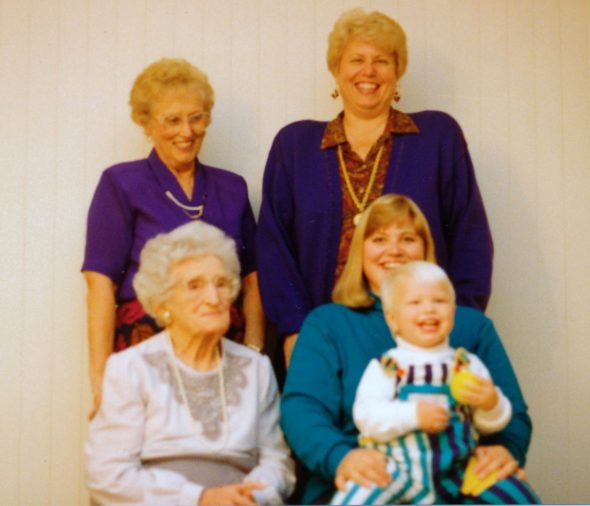
Five generations – from lower left – Elsie Hobson, Ruth Gold, Diana Trautwein,
Lisa Fischinger, Ben Fischinger — taken in Orange County, 1991
My parents worked hard to create a good home for the three of us. There was one salary in our home, and that one a teacher’s salary, so we didn’t do fancy things. But we listened to all kinds of music on my dad’s home-built hi-fi set (or from his fingers at the keyboard), we camped all over California, and we enjoyed extended family gatherings on both sides, especially gatherings at some of the beaches along the southern California coast.
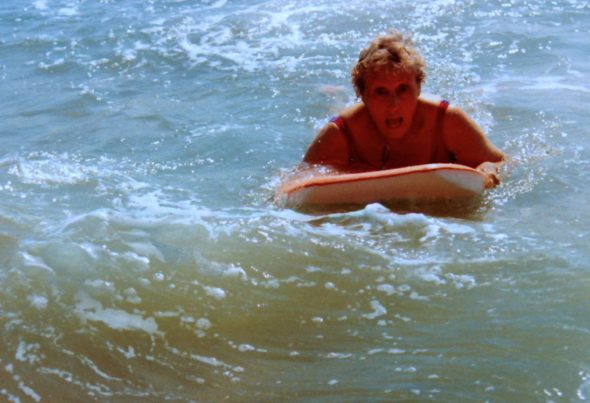
Mom, doing what she loved more than almost anything else: boogey-boarding, Huntington Beach,
sometime in the 1980s, I think. She would have been in her early 60s.
Toward the end of his career as a professor and administrator at the junior college level, my dad had some serious health issues that required them to move out of the valley and closer to the sea. They lived in Oceanside for two years, then settled into a lovely town home in Mission Viejo, in Orange County. They loved that community and lived there for about fifteen years. In 2002, we moved them to a retirement community in LaVerne CA. My father died two and a half years later in February of 2005. My mom lived there independently until 2012, when Alzheimer’s put her into assisted living. The next year, we moved her to The Samarkand dementia unit, just ten minutes from our home here in Santa Barbara.
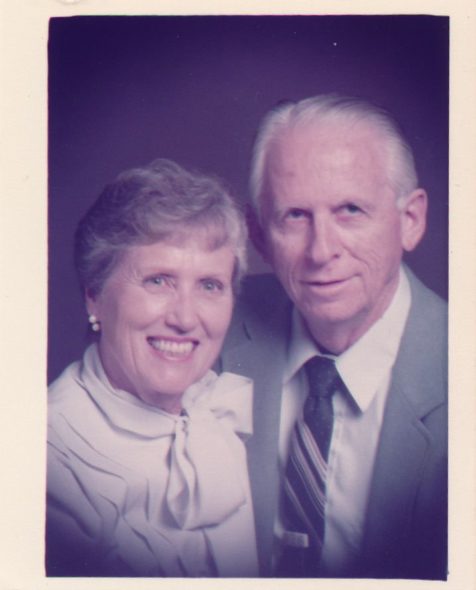
My parents, when they lived in Orange County
While they were in Orange County, I took the train south once each month for a long midweek visit. After they moved to LaVerne, I drove south monthly, then twice monthly, and stayed with our daughter, who lived about 30 minutes from there. All of those visits were an attempt to be as present as I could be with the two of them, and then with my mom, while their bodies breathed earth’s air.
Those bodies of theirs were holy to me, often in ways I didn’t fully understand. They had birthed me, loved me, tended me when mildly wounded or critically ill, clothed me, fed me and gave me away to my husband. (Yes, that is an outdated term, one that I no longer use, but it’s the truth of my lived experience in that season of my life.) I was with my father three days before his death, praying the blessing of Aaron over his unconscious, frail frame, telling him how much I loved him and how grateful I was for his care for me. When my brother called to tell me he had died, I asked that his body remain in the room until I could get there. Our bodies are supremely important collections of cosmic dust; they bear the image of an invisible God, they carry our stories, our selves. I wanted to honor him by honoring what remained.
Last week, I had the privilege of doing the same thing for my mama. Her journey took eight days, and every one of those days, I was by her side. Most of the time, I sat in front of a window, using only natural light. I put Pandora onto a hymn station and played it for hours. I finished a large crochet project. I called for more meds, as needed. I got up and blessed her face, stroked her shoulders. I ate the lunches I packed, I took occasional walks. I thanked every one of the Hospice team who came and cared for her so lovingly. One woman offered sponge baths, one offered quiet company, another brought her guitar and sang. The nurses were supremely skilled and compassionate, as were the caregivers at the facility. My pastor came twice, my friend Sherry, Samarkand chaplain for over twenty years, came daily.
Room 62 became holy ground during those long days.
At 4:32 p.m. on Wednesday, Sherry and I stood beside her and my friend said, “Look! Her eyes are open!” Those eyes had been closed for most of the previous five days. Her breathing was quite labored at this point, but as her eyes flew open, the noise stopped. She gasped twice and looked right into my eyes as I blessed her, thanked her, loved her. And she flew. I mean she flew to Jesus in those moments. I had been visualizing my father, my brother, her siblings, her parents and so many of her friends all around that room for days. And I do believe that in that moment, she saw them. And she was not afraid.
All those dear ones welcomed her home — with love, joy and laughter. This I know, in the deepest part of me, this I know.
We will bury her on Tuesday morning, dropping her earthly remains into the grave plot she will share with my dad. We will hold a special service of worship to celebrate her life on May 20th at 2:00 p.m. in The Chapel at the Samarkand, the place that she called, ‘my church.’
Over and around the fatigue that I feel at this end of the journey, the strongest emotion in my heart is gratitude. It absolutely overwhelms me at some moments. There is sadness, yes, there is sadness. But over and around and in between everything else, there is thanksgiving. For 95 years, she graced this earth, 72 of them with me in the center of that grace.
Thank you, Mama. And thank you, God.
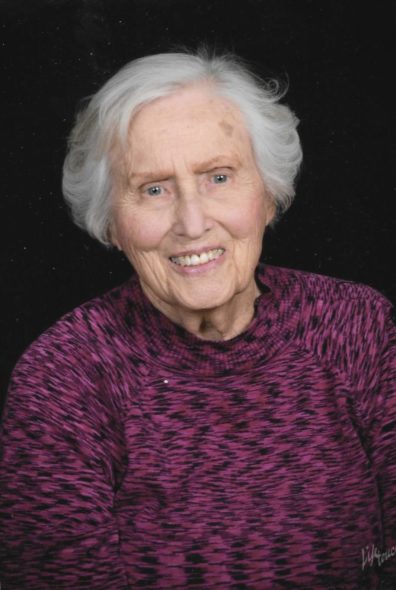
November, 2015, last formal portrait
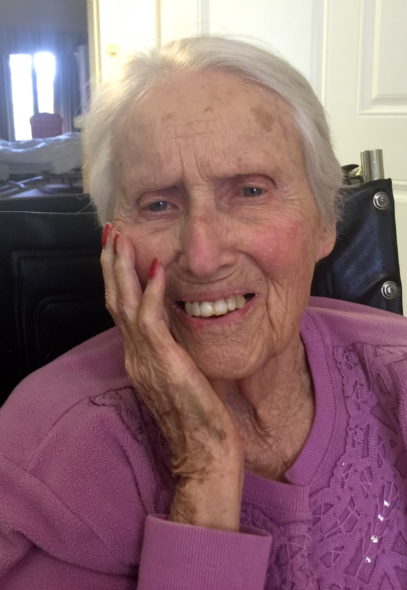
April 7, 2017
The Truest Advent
I sit and watch the light play across the beautiful angles of her face. Even at 95, those cheekbones are breathtaking. She is tired today, battling a mild infection, with little to no appetite and even less energy. The sharp angle of the winter sun is unexpectedly flattering as it gently flickers through the window, and I draw a sharp breath as those too-familiar tears begin to form behind my eyelids.
“Oh, Mama! I love you so. Please, Lord, let her go to sleep and wake up in the New Creation. Enough, okay? Enough.”
But who really knows how much is enough? I don’t have any special insights, only my own bedraggled emotions and growing fatigue. To me, it feels like it is time. Time to be released from this ‘body of dust,’ time to rest from the struggle, time to breathe in and never breathe out again.
We did not go out to lunch today; we barely made it from the dining room to her own sweet space, with its lounge chair in the corner, by the window. “My arms!” she cried softly as we walked. “They ache.”
Truth be told, everything aches. Every cell in her body.
As she slept in that chair, I moved my hand slightly, the one that she was clasping with both of hers. She roused a bit, turning to look in my direction.
“Oh, Mama! Thank you for being such a good, good mother,” I cried.
She didn’t understand me, so I said it again, more slowly, more loudly. She smiled slightly and said a simple, “Thank you.” Somehow her half-sleepy state made the usual questioning unnecessary. There were no confused looks, no puzzled frowns. None of this response: “I’m your mother?? Really??”
None today. None at all.
One week ago, that’s all I heard. I came home shaking my head at my husband. “I don’t know how much more of this repetition I can navigate! We spent our entire 90 minutes together today asking and attempting to answer the same 5-6 questions — over and over and over again. Oh, Lord, give me patience!”
He and I were getting ready to leave town the next morning, our annual anniversary getaway to parts north. We both needed it — time and space to savor an ocean view, good food prepared by someone else, and quiet time together — no expectations, no obligations, no schedule. And it was good. Very, very good.
They called me from the dementia unit as we were driving home yesterday. “She has a UTI and a low-grade fever. Is it all right with you if we put her on antibiotics?”
Yes, it was all right with me. UTIs make dementia much worse and increase confusion and disorientation. She doesn’t need any escalation of those symptoms and neither do I. But this time around, the infection plus the added medication led to extreme exhaustion — one more sign of decline, diminishment.
And yet, as painful as it is to watch that happen, this time I will admit that my primary response is relief and gratitude. She is heading in one direction only; and today’s exhaustion underlined that truth for me. My mother is very old. She is very frail. She is extraordinarily confused.
She is also beautiful, grateful, loves people (even when she hasn’t a clue who they are), sings the old songs and hymns with a higher degree of accuracy than her illness might lead you to expect, and generally enjoys her life. It is not up to me when that life will end on this side of the mysterious veil that separates us from the eternal.
There are, however, some decisions that are up to me. When and how to treat illness, for one. I think I know what I will and will not allow — mom and I discussed it all, long before dementia took over — but until illness or accident happens, I suppose it’s all pretty hypothetical.
So, in addition to those prayers for patience, I also pray for wisdom, grace, kindness and insight as my mother moves ever closer to the end of her long and remarkable life. I will miss her presence in my life more than I can adequately put into words, more than language will allow.
Then again, I have been missing her for a very long time.
“Oh for grace to trust him more!”
Longing for Home: An Advent Journey, 2016 — Day Twelve
Psalm 146:5-10
Ruth 1:6-18
2 Peter 3:1-10
Ruth 1:6-18
Then she started to return with her daughters-in-law from the country of Moab, for she had heard in the country of Moab that the Lord had considered his people and given them food. So she set out from the place where she had been living, she and her two daughters-in-law, and they went on their way to go back to the land of Judah. But Naomi said to her two daughters-in-law, “Go back each of you to your mother’s house. May the Lord deal kindly with you, as you have dealt with the dead and with me. The Lord grant that you may find security, each of you in the house of your husband.” Then she kissed them, and they wept aloud. They said to her, “No, we will return with you to your people.” But Naomi said, “Turn back, my daughters, why will you go with me? Do I still have sons in my womb that they may become your husbands? Turn back, my daughters, go your way, for I am too old to have a husband. Even if I thought there was hope for me, even if I should have a husband tonight and bear sons, would you then wait until they were grown? Would you then refrain from marrying? No, my daughters, it has been far more bitter for me than for you, because the hand of the Lord has turned against me.” Then they wept aloud again. Orpah kissed her mother-in-law, but Ruth clung to her.
So she said, “See, your sister-in-law has gone back to her people and to her gods; return after your sister-in-law.” But Ruth said,
“Do not press me to leave you
or to turn back from following you!
Where you go, I will go;
where you lodge, I will lodge;
your people shall be my people,
and your God my God.
Where you die, I will die—
there will I be buried.
May the Lord do thus and so to me,
and more as well,
if even death parts me from you!”When Naomi saw that she was determined to go with her, she said no more to her.
Oh my goodness, how I love these words! I love this story. I love these characters. There are lots of reasons for my abiding love for the story of Ruth — there is the obvious one — my mother’s name and my middle name match the title of this book. It’s a story about women, and those are few and far between, especially in the Old Testament. It’s a story about family commitment on many levels, Naomi and Ruth to one another, Boaz to Ruth and Ruth to Boaz. And it’s a story with a beautiful, fulfilling ending after a painful beginning.
Most of all, however, I love this story because I believe it’s given to us as a picture of God’s immense loyalty and love for his human family. And the character of God is female — who knew?? The character traits exhibited by Ruth throughout this tale are ones that the Old Testament frequently uses to describe the character of God. Chesed, faithfulness/loving-kindness/loyalty. Ruth has that in spades.
And these particular words are famous anywhere the Bible is read. I suppose they are most often used in wedding ceremonies, which is a little bit odd, when you come to think about it. After all, they were spoken by one woman to another, by one generation to another, by one homeless wayfarer to another. There is nothing traditionally romantic about them at all. They are fierce words, aren’t they? They show grit, determination, conviction and commitment. Maybe that’s why they show up in weddings, eh? The whole idea of commitment over a lifetime is in exceedingly short supply these days. Maybe it’s time to dust them off and use them in as many settings as we can think of! What do you think?
Longing for Home: An Advent Journey, 2016 — Day Ten
Psalm 21
Isaiah 41:14-20
Romans 15:14-21Isaiah 41:14-20
Do not fear, you worm Jacob,
you insect Israel!
I will help you, says the Lord;
your Redeemer is the Holy One of Israel.
Now, I will make of you a threshing sledge,
sharp, new, and having teeth;
you shall thresh the mountains and crush them,
and you shall make the hills like chaff.
You shall winnow them and the wind shall carry them away,
and the tempest shall scatter them.
Then you shall rejoice in the Lord;
in the Holy One of Israel you shall glory.When the poor and needy seek water,
and there is none,
and their tongue is parched with thirst,
I the Lord will answer them,
I the God of Israel will not forsake them.
I will open rivers on the bare heights,
and fountains in the midst of the valleys;
I will make the wilderness a pool of water,
and the dry land springs of water.
I will put in the wilderness the cedar,
the acacia, the myrtle, and the olive;
I will set in the desert the cypress,
the plane and the pine together,
so that all may see and know,
all may consider and understand,
that the hand of the Lord has done this,
the Holy One of Israel has created it.
I gotta say, the pickins for today are SLIM. At least at first read-through. But then I read through the prophet one more time and was immediately struck by all the water imagery in the second verse up there. Look at that magnificent word picture, will you?
When the ‘poor and needy’ need water, where must they go to find it? To God alone, that’s where. And though many of us are far from poor economically, we are all poor in spirit, poor in resources, poor in faith, poor in trust. And God promises not to forsake us in our thirstiness. Water will appear in unexpected places — on the ‘bare heights,’ in the ‘midst of valleys,’ in the wilderness, there will be pools, and in the dry land, springs will appear. God alone will put in trees, a wide variety of shade and even fruit bearing green things for our comfort, enjoyment, nourishment. The needs of our senses will be met, as well as our spirits. These trees are even sweet-smelling!
And God will do this as a sign — a sign to the wider world of God’s activity in that world, of God’s provision for your deepest and most basic needs. A sign of hope.
I could use a little of that just now. What about you?
Longing for Home: An Advent Journey, 2016 — Day Nine
Today’s post is a little bit different. I offered the prayer of consecration and supplication in yesterday’s worship service and am posting that prayer here. It comes out of the same set of readings we looked at yesterday and seemed an appropriate way to launch into this third week of Advent. We will be back on schedule with our daily readings/reflections tomorrow.
An Advent Prayer
2nd Sunday, December 4, 2016
Montecito Covenant Church
It’s the Sunday of peace, Lord, and we gather now around your table
to remember how you chose to come to us,
as one of us,
to be our peace.
Yes, it is your death we remember
as we gather round today.
When we come to this table, we remember your sacrifice on our behalf,
and we thank you, with our whole hearts.
But on this particular Sunday of the year,
we also remember your life among us,
as one of us, and we remember it from that very first moment
when your mother heard
a special word from your Father,
from our Father.
And oh, we thank you for that, too, with our whole hearts.
We also must admit that some of these hearts of ours
feel far from peaceful this morning, Lord.
Some of us are grieving the loss of a person we love very much;
some of us feel utterly exhausted — by school, by life, by illness;
some of us are worried about people we love; some of us are frightened about
something we ourselves are facing into right now.
In this moment of silence, we lift those concerns before you now.
— SILENCE —
And now, as we gaze on this bread,
as we consider this cup,
will you help us to remember
that this ordinary, torn-up loaf
and this common purple liquid
become something more,
for us and in us, on this day.
We offer these simple things to you now,
and ask you to bless them, to set them apart,
and to make them uniquely beneficial to us, in body and in spirit.
May they become emblems of your love,
and strong, clear symbols of your Peace.
Even as Gabriel spoke to Mary those strange and wonderful words of invitation,
may you speak to us through
this time at the table.
Help us to hear you,
help us to be open to whatever invitation you are extending to us,
both individually and communally,
and help us to say a resounding,
“YES — let it be to us according to your word!”
And then, Lord, as we gather our belongings and turn to head out the back door into the sunlight and the friendly chatter of the patio, will you help us to remember that there are “Elizabeths” all around us today — male, female, young, old — all sorts of folks who have in some way or another experienced the reality that for you, “nothing is impossible.”
Give us eyes to see and ears to hear
the miracle stories that are all around us.
No, not all of those stories have what we might label a ‘happy ending’ —
Mary’s story wasn’t exactly all sweetness and light, was it?
But all of us who have walked with you for a little while or for a lifetime —
all of us know
that your faithfulness can be trusted,
that your goodness is unassailable,
that your peace is ever and always available,
even when the tough stuff happens.
Help us to live those truths, those stories, out loud, Lord.
Help us to be encouragers in all our interactions with one another
and within the larger communities
where we live and work.
Help us, dear Lord,
to seek peace and to live it.
For Jesus’ sake.
Amen.
Longing for Home: An Advent Journey, 2016 — Day Eight
2nd Sunday of Advent Readings:
Isaiah 11:1-10
Psalm 72:1-7, 18-19
Romans 15:4-13
Matthew 3:1-12
Romans 15:4-13
For whatever was written in former days was written for our instruction, so that by steadfastness and by the encouragement of the scriptures we might have hope. May the God of steadfastness and encouragement grant you to live in harmony with one another, in accordance with Christ Jesus, so that together you may with one voice glorify the God and Father of our Lord Jesus Christ.
Welcome one another, therefore, just as Christ has welcomed you, for the glory of God. For I tell you that Christ has become a servant of the circumcised on behalf of the truth of God in order that he might confirm the promises given to the patriarchs, and in order that the Gentiles might glorify God for his mercy. As it is written,
“Therefore I will confess you among the Gentiles,
and sing praises to your name”;and again he says,
“Rejoice, O Gentiles, with his people”;
and again,
“Praise the Lord, all you Gentiles,
and let all the peoples praise him”;and again Isaiah says,
“The root of Jesse shall come,
the one who rises to rule the Gentiles;
in him the Gentiles shall hope.”May the God of hope fill you with all joy and peace in believing, so that you may abound in hope by the power of the Holy Spirit.
I love it when Paul pulls the threads together like this! He digs into the scriptures he knows and loves and he builds a beautiful argument for the work God has given him to do: evangelize the Gentiles. Read that first line over a few times and sit with it for a bit.
“For whatever was written in former days was written for our instruction, so that by steadfastness and by the encouragement of the scriptures we might have hope.”
Exactly. Our scripture is written down for our instruction and encouragement so that we might have HOPE. These words of ours are never meant to be used as weapons, threat, or excuse. They are designed for our good — to teach us, to encourage us and to inculcate hope within us. And Paul takes those words — which he had previously used as weapons and threat and excuse for his inexcusable and hateful behavior — and because of his encounter with the risen Christ, he learns to handle them with loving care, prayerful attention and a listening heart.
And voila! He discovers the truth that he longs for and that he now lives: the Gentiles are included in God’s mercy and plan. Think about that for a minute. The same one who was hell-bent on destroying all the followers of The Way, the same one who stood collecting the coats of those who were stoning Stephen to death, the same one now sees something entirely different in the scriptures of his youth.
As we grow in our faith and in our understanding of the heart of God, we, too, will discover things we never knew were there. Maybe even things that are exactly the opposite of what we had always supposed to be there. Maybe even things that will turn the world upside down.
Which is exactly what happened to our friend and mentor, Paul. Exactly.
Longing for Home: An Advent Journey, 2016 — Day Three
Psalm 124
Genesis 9:1-17
Hebrews 11:32-40
As I gathered together this year’s readings for Advent, I noticed that there are several about covenants, those special ‘agreements’ God made with people that are scattered throughout the Old Testament and then grandly fulfilled with the coming of Jesus. Today’s Genesis reading contains the agreement God made with Noah, once he and his family were released from their long siege of forced isolation on that strange boat.
Covenant agreements are always initiated by God and overflow with God’s promise of presence and blessing. But this one is unique. Why? Because God very deliberately makes promises not only to Noah and his family, but to all of creation:
“I am establishing my covenant with you and your descendants after you, and with every living creature that is with you, the birds, the domestic animals, and every animal of the earth with you, as many as came out of the ark. I establish my covenant with you, that never again shall all flesh be cut off by the waters of a flood, and never again shall there be a flood to destroy the earth.”
The rainbow is set in the sky as a reminder to God to keep those promises, and three more times, God repeats this phrase: “my covenant that is between me and you and every living creature of all flesh.” THREE times. Do you think maybe it might be important?
ALL creatures matter to God. Isn’t that remarkable? We humans so easily place our species at the center of everything, don’t we? Yet in this Old Testament covenant, God intentionally includes all the things on earth that breathe. And if God values these creatures, maybe we should too? I think a biblically mandated argument for conservation and environmental protection can be made from passages like this one. What do you think?
